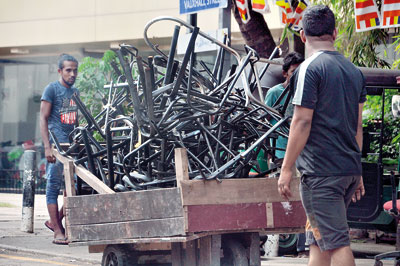News
Scrap metal exporters accused of violating rules
Gross disregard for guidelines regarding the export of scrap metal is having a negative impact on the local metal industry as tons of material that can be refined locally are being sent abroad illegally.

Scrap metal being collected. Pic by Ranjith Perera
The law permits only the export of locally un-refinable scrap on the basis of a certificate issued by one of three government institutions– the Industrial Technology Institute, the National Engineering and Research Development Center and the University of Moratuwa– certifying that such material cannot be refined in Sri Lanka.
But it is alleged that reports are being manipulated and scrap metal is being smuggled abroad, avoiding levies due to the state, said Professor R G N De S Munasinghe of the Department of Materials Science and Engineering at the University of Moratuwa.
Prof Munasinghe explained that although they inspect the samples provided by companies, they cannot ensure that the entire stock of metal exported belongs to the same class as the sample metal due to non-availability of machines and human resources as well as a mechanism to inspect containers.
He said, even though the university issues a certificate confirming the composition of the metal, the exporters manipulate the (HS) Harmonized Commodity Description codes to export re-usable metal components to India and Malaysia without value addition.
The Foundry Development and Service Institute, which represents the local metal industry has been at the forefront of attempts to halt exports of scrap.
Its chairman Melvin Samarasinghe wrote to the Director General of Customs, with a copy of the letter to President Maithripala Sirisena, recently, asking him to intervene to stop this destructive practice alleging that a group of around 10 exporters were engaged in exporting valuable stocks.
Mr Samarasinghe alleges that the export of cast iron, copper and brass scrap was banned in 2009 to encourage local industries and to add value to industrial products locally. This decision was further consolidated by a Cabinet decision in 2014.
However, since 2015, these rules have been largely disregarded.
“Scrap metal exports have impacted 40,000 people and over 60 medium industries and over 300 small industries in the Kaduwela, Gampaha, Kandy and Kegalle districts. These industries generate a net revenue of over Rs 750 million per month by producing value added products such as water pumps, manhole covers, machinery and spare parts, but this has almost come to a standstill due to the shortage of scrap metal,” he said.
“Industries manufacturing water pumps, tea machinery, agricultural machines as well as manufacturers of locally-made sawing machines, and construction material would be competitive if local scrap was available, but today, local businessmen sell scrap metal at a reduced value to foreign countries,” he added.
However, the export companies claim that they, too, are seeking foreign exchange earnings by selling non-reusable metals which cannot be recycled in Sri Lanka.
Nazim Huzain, the secretary of Expo Seylan (Pvt) Ltd said that they have to face delays and even cancellation of metal purchases to be sent abroad since the samples that they sent to the Moratuwa University are rejected.
He said an independent unit is needed to get samples from containers and to submit impartial reports.
Meanwhile, a local recycler as well as the chairman of the Sri Lanka Recyclers’ Association, Sudesha Nandasiri, said they condemn and oppose the selling of locally-used metal abroad, since copper wiring companies and iron and brass industries are affected due to the lack of scrap metal.
Mr. Nandasiri said that, according to a cabinet decision, non-reusable metal can be exported without value addition, but reusable items have to be sent abroad with a value addition of 100 to 200 percent.
A Edirisinghe, Director General of the Department of the Government Factory, which provides metal and carpentry products to public sector institutions, said that the factory uses refinable metals such as cast iron, aluminium, copper, and brass to make iron gates for sluice gates, door knobs, and small locking mechanisms for ballot boxes etc.
He said that 60 to 100 tons of reusable metal are used per year.
“We call for tenders and purchase metal from both private and government entities to fulfil our requirements, yet in some instances we have to go for external purchasing as there is a shortage of scrap metal.’’
The Additional Secretary, Industry Development, of the Ministry of Industry and Commerce, S Balasubramaniam, said that scrap metal exports are regulated based on guidelines. “The Ministry only approves according to the recommendations of one of the three institutes,” he said.
Deputy Director Customs (Prevention), Vipula Minuwanpitiya denied that the Customs has committees to decide which items should be shipped. He said that the Customs normally checks the documents submitted by the Imports, Exports Commissioner who comes under the Ministry of Industry and Commerce, before exports are cleared.
He also added that for some items there is no need for approval from the Commerce Ministry as they are exported as items that cannot be used. He said that the Customs checks the HS codes.
Mr. Minuwanpitiya admitted that they cannot check every consignment but if they are given a specific complaint or receive a tip off they can detain the consignment and check it.
If there is any malpractice or manipulation of substances or any manipulation of letters, the complainant should verify the specific consignment and explain the malpractice.
“We only allow items approved by the Commerce and Industry Ministry,” he said.

